A Look At Space: 1999
The Rocket's Blast Comicollector {RBCC} No 123
Dept. Of Divergent Opinion p23-29:
A LOOK AT SPACE: 1999
By Thomas D.N. Zaenger, Mark Burbey and James van Hise
Two of these three reviews are positive, and the negative one - Zaenger- seems based on viewing less episodes and displays some profound scientific ignorance. Overall a welcome antidote to the knee-jerk hostility of many critics. I've noted some factual errors along the way. See also the set visit in RBCC 119, and the parody comics from RBCC 128 and 135. Thanks to Jenny Lobb
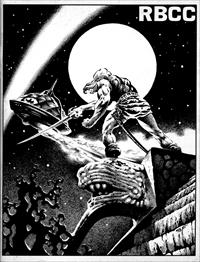
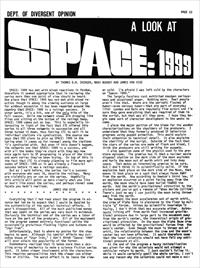
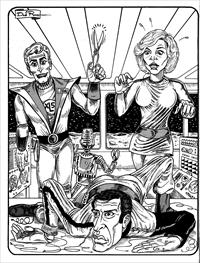
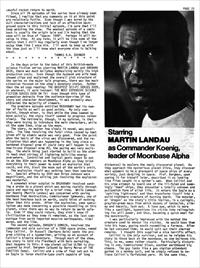
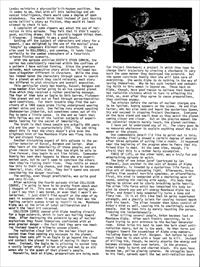
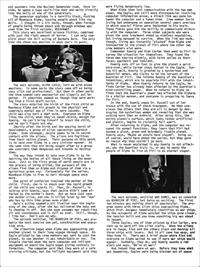
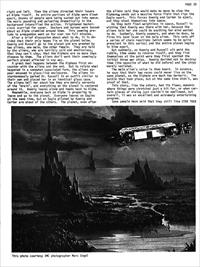
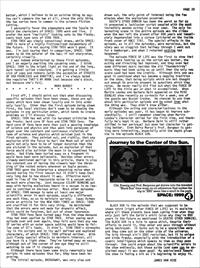
Space: 1999 has met with mixed reactions in fandom, therefore it seemed appropriate that in reviewing the series more than one point of view should be heard. One place that Space: 1999 has not met with mixed reaction though is among the viewing audience at large for without exception it has been reported around the country that Space: 1999 is a ratings success. In other words, it's a hit, one of the only hits of the Fall season. While new network shows are dropping like flies and sitting at the bottom of the ratings heap, Space: 1999 comes out on top. This is especially interesting in light of the fact that ITC offered this series to all three networks in succession and all three turned it down, thus forcing ITC to sell it to individual stations via syndication. One source now says that CBS plans to pick up Space: 1999 in the Spring when it comes up for renewal among the stations it's syndicated with. But even if this doesn't happen, the networks see that Space: 1999 is a success, and with all the bombs they're stuck with they may now once again turn to SF programming in place of the tired and worn series they've been trying. On top of this is the fact that ITC is already planning to film more episodes of Space: 1999 as it was already a financial success before it was a ratings success.
But as I said before, the series isn't a success with everyone who sees it, despite the ratings. Many are violently pro or con on the series. Hopefully this article will point up more clearly what you like or don't like about the series, and perhaps reveal some facets you hadn't realized.
JAMES VAN HISE
Everything that I had read about the program in advance had led me to expect that I would be dazzled by the authenticity of the special technical effects. I wasn't disappointed. All of the much publicized money that was spent on the series was very much In evidence. Obviously the technical end of the series was a labour of love on the part of the producers. All of the equipment on the program seemed entirely functional unlike the occasionally gratuitous flashing lights and buttons on 'Star Trek".
Unfortunately, that is where my praise for the show begins to wane. Although its special effects may outshine those of "Star Trek," I don't think Space: 1999 will ever attain the popularity of the former.
Roddenberry realized that it takes more than a dazzling array of mechanics to make a science fiction series work. It takes viewer involvement with the characters. This requires personalities that the viewer can either like or dislike. The worst effect is to leave the viewer cold. I'm afraid I was left cold by the characters on Space: 1999
The largely faceless cast exhibited deadpan seriousness and occasional anger. Nothing more. Real people aren't like that. Where are the periodic flashes of humour--even nervous humour--that are part of everyday life? Landau and Bain are reputedly fine actors and I'm sure they gave everything that was required of them in the script, but that was all they gave. I hope they begin some sort of character development in the weeks to come.
I place the major portion of the blame for the wooden characterizations on the shoulders of the producers. I understand that they formerly produced SF television programs using puppet animation. This would explain their attention to technical detail. It also explains the sterility of the script. Outside of the fact that the stars of the series are made of flesh and blood, I think the producers are still writing for puppets.
I also question some of the physics used in the premiere episode. The premise has it that a nuclear waste disposal station on the dark side of the moon explodes and hurls the moon out of earth orbit and into deep space. That makes an interesting premise to be sure, but I don't think it is scientifically valid. If the explosion took place on the dark side of the Moon, that means it took place on a spot that always faces AWAY from the earth. Now according to Newton's third law, if an explosion occurred on a point facing away from the earth, the moon should have been hurled TOWARD the earth. Add the earth's gravitational attraction to the picture and you've got a remake of "When Worlds Collide". There's just no way I can justify the moon being thrown away from the earth. [The Moon has considerable orbital velocity. An explosion, even on the far side, might alter the orbit, but would not abruptly propel it into the Earth.]
The moment the moon accelerates out of earth orbit, the crew of Alpha Base is plastered to the floor by multiple "g" forces. Unless my scientific knowledge is faulty, I don't think that was accurate either. Astronauts lifting off from Earth feel increased gravitational pressure due in large part to the movement away from the earth's centre, the theoretical origin of gravitational attraction. On the moon the Alpha Base crew would be affected by the gravitational forces from the moon's centre. Even though the moon is thrown out of orbit, the relationship between the crew and the moon's centre has not been affected. It would therefore seem that the lunar colonists should not have felt any additional pressure at all. [His scientific knowledge is faulty. The "G" forces are the result of Newton's first law (inertia). The presentation is accurate science.]
At the end of the program a hasty rationalization was given for why the colonists would not attempt a vehicular return to earth. I just couldn't follow it. While it would certainly spoil the whole series, I can't see any reason why the colonists could not make a successful rocket return to earth. [According to the dialogue, they couldn't work out a flight plan due to the Moon's unknown trajectory]
Since all 24 episodes of the series have already been filmed, I realize that any comments on it at this point are relatively futile. Even though I was bored by the dull characterizations and lack of an effective background score in this initial episode, I'm sure that I'll keep watching the show. The weakest episode of a comic book is usually the origin tale and I'm hoping that the same will be true of Space: 1999. Perhaps it will develop in time. At any rate, it will be like some of the comics that I still buy regularly even though I no longer enjoy them like I once did. I'll want to keep up with the show just so I'll know what everyone else is talking about.
THOMAS D.N. ZAENGER
In the days prior to the debut of this British-made science fiction series starring MARTIN LANDAU and BARBARA BAIN, there was much ballyhoo emphasizing mainly its high production costs. Even though the husband and wife team showed clips and explained the overall plot structure of the series on the major talk programs, there was too much attention focused on the show's monetary status. Rather than the ad copy reading: THE GREATEST SCI-FI SERIES EVER, or whatever, it said Instead: THE MOST EXPENSIVE SCIENCE FICTION SERIES EVER ON TV! Even though this type of promotion detracts from the audience's eye-view of the story and character development, it was probably what attracted the majority of viewers.
The premiere episode entitled Breakaway had its number of faults as well as good points. My only complaint, though minor, is that while the show seemed to move quickly, the story itself seemed to progress rather slowly. The rationale, though, in my opinion, is that they were trying to introduce the main characters, while at the same time, blow up the moon.
The story, no matter how slowly it moved, was excellent. The idea Involving the fatal virus caused by heat qiven off by atomic waste was very good. From the point when the basis of the virus was discovered, and the realization that what was happening in the long since abandoned disposal area #1 could very well happen in the now-in-use disposal area #2, the pacing was very exciting. The whole thing just started to build as the atomic heat shot strings of lightning bolt-like energy everywhere. Controlled and logical panic began to set in on the 300+ members on Moonbase Alpha as they tried everything in their power to avert an explosion that could, and did, blast the moon out of the earth's orbit.
The explosion itself was nothing less than spectacular. Special effects by 2001 man Brian Johnson were magnificent, and the editing job involving the explosion was masterful.
A somewhat minor subplot in Breakaway involved sending a probe to a planet which was moving rapidly through space and nearing earth for a brief time. While Commander Koenig (Martin Landau) was concerned with saving moonbase from destruction, Commissioner Symmonds [Simmonds], one of the head honchos back on Earth, could think of nothing other than this probe. After the explosion, some speculation was made concerning a possible resettling on this planet, since there was no way to return to Earth safely. Even If they could return, they didn't know if civilization as they knew it remained, as the last communiqué from Earth reported massive earthquakes, tidal waves, and the like.
The second episode, DRAGON'S DOMAIN, involved the commander and sole survivor of a 1996 space probe, named Tony Cellini. Dr Russell (Barbara Bain) opens the program sitting at a typewriter, writing up an account of Cellini's bizarre adventure. Through much of the show, the story is told via flashback with Bain narrating. What happens is this: A new planet called ULTRA is discovered by Prof. Bergman (played by Barry Morse of The Fugitive fame). Cellini and a crew of four set out in an Eagle (a large shuttle-type craft capable of long distances) to explore the newly discovered planet {They set out in the Ultra Probe, not an Eagle]. As they approach the mysterious planet Ultra, they discover what appears to be a graveyard of space ships of every variety, just dangling in space. Prof. Bergman, upon seeing it for himself later, described it as looking like flies caught in a spider's web. When Cellini and his crew attempt to board one of the ill-fated and seemingly "dead" ships, they encounter a totally unknown and outlandish form of alien life. It enters the Eagle as a swirling light-mass and then transforms itself into a solid nightmare creature of burning death. The monster, or "dragon' as the story's title implies, is a cyclopic, grayish-green mass from which dozens of tentacles, slimy and beastly, lash out. A lone eye, which is more like a spotlight, hypnotizes its victim into relinquishing its will power, and thus, becoming a quick meal for the monstrosity.
I was particularly impressed with the method the creature used to devour its victims. He would toss them into his huge, gaping mouth resembling a furnace. After he had consumed them, he would spit out their charred remains. I thought this supplied a nice horrific effect.
Cellini is the only survivor, and as he relates his story to those back at the moonbase, no one believes him. This, to me, seems rather stupid. Particularly disturbing is one, Commissioner Dixon, another earthbound big cheese. The guy looks like a gas station attendant garbed in a monkey suit, and he simply refuses to believe Cellini's far-fetched yarn. At the same time, Landau maintains a why-couldn't-it-happen position. Now it seems to me, that with all this technology and advanced intelligence, there would come a degree of open mindedness. You would think that instead of just tossing aside Cellini's story as fiction, they would at least attempt to check it out. [As the flight recorder cuts out, there is no evidence of what happened. Dixon is looking for someone to blame for the deaths.]
A complaint of some viewers was about the use of narration in this episode. They felt that it didn't supply good, exciting drama; that it possibly bogged things down. I disagree. I thought it was a good touch.
Getting off the subject of characters and story for a moment, I was delighted by the use of the musical piece "Adagio" by composers Albinoni and Giazotto. It was also used in Rollerball, and somehow it lends itself perfectly to the sombre atmosphere of a futuristic science fiction scenario.
With the episode entitled DEATH'S OTHER DOMAIN, ["Death's Other Dominion"] the series has consistently remained within the confines of a pattern I have noticed forming. Since the premiere episode, each consecutive story which has followed has been altogether different in structure. While the show has indeed taken the characters through space in search for a planet on which they could relocate, each story has differed in plot structure and overall execution.
This particular story had Koenig. Russell, Bergman and crew member Alan Carter going to an ice covered planet from which they received a rather perplexing message. The four of them take an Eagle to this barren, Plutoean-like planet and set out on foot through worse-than-blizzard conditions. For their trouble they find the survivors of a 1986 space probe living underground wearing animal skins and such. One fellow runs around spouting Shakespearean gibberish, but sometimes comes out of his fog to make a little sense. In the end we learn that this fellow was one of the luckier subjects of experiments looking for the secret of immortality.
The truth is that these people are actually 800 years old and the year is approximately 2751. The odd thing about this is that the story doesn't give even the slightest hint of how Moonbase Alpha was flung into the far and distant future.
Another disturbing aspect of this episode is the peculiar behaviour of Russell, Bergman and Carter. When they learn of the immortality of these people, and are given reason to believe that they too might be able to live forever, they begin to act like idiots. Commander Koenig has seen what happens to those who are experimented upon, but he can't seem to convince the others that they're risking their lives. They rattle on about how this is their big chance, and they want to become immortal blah, blah, blah They don't spend one second considering the danger involved.
The ending, even though predictable, was quite good and very EC-ish.
After watching the fourth episode titled COLLISION COURSE, I'm going to have to be pretty frank about what I thought of it. This one was the slowest moving yet. I can't say that I was bored, or even that I wasn't entertained. I just didn't find myself on the edge of my seat in suspense when it was obvious that that was the feeling certain scenes tried to instil in me. Moonbase Alpha was on the brink of total obliteration and I wasn't the least bit concerned.
COLLISION COURSE opened with Alpha heading directly for a huge asteroid, which in turn was hurling toward them. After destroying the asteroid by way of nuclear explosives they found themselves confronted with an even greater danger - the fact that they were now heading instead toward a hitherto unseen planet.
The radiation cloud left by the nuclear blast prevented them from sending any messages to the planet. Koenig then sets off in an Eagle to go beyond the cloud and contact the planet in hopes of making it their new home. Instead, the Eagle he is piloting is sucked into a vastly larger ship of alien origin and met by an old woman who is the queen of that planet's people.
Meanwhile, back at Alpha, preparations are being made for Project Shockwave; a project in which they hope to change their trajectory by creating a shockwave in very much the same manner they destroyed the asteroid. But the queen convinces Koenig that she will take care of everything. She wants Alpha to do nothing in the way of saving themselves. Why he has such instant and undoubting faith in this woman is beyond me. Those back on Alpha, though, have good reason to believe that Koenig has radiation sickness which in turn is affecting his mind, so, even after they agree to cease preparations, they continue anyway.
Two minutes before the series of nuclear charges are to be ignited, Koenig appears on the scene. He and Alan Carter, who has also seen end heard the mysterious Queen, try and succeed in stopping Project Shockwave. Everyone on the base stand and await doom as they watch the planet coming closer and closer. But on the precise moment the two celestial objects barely touch, the planet vanishes.
I have yet to understand any of it. The story goes to no measures whatsoever to explain anything about the old woman or the planet.
One commendable detail I'd like to point out is this; Martin Landau finally showed a certain degree of emotion after three episodes of acting like a robot. It happened near the beginning of the program when he fears that his friend Alan is dead. At the same time, though, I'm afraid that this is a rather hasty assumption.
FORCE OF LIFE, on the other hand, was a truly fun and entertaining episode to watch.
The body of one Anton Zoref (portrayed by Ian McShane), just another in the cast of dozens of Alpha crew members, is invaded by a mysterious life force; a blue orb of energy-consuming light. Afterwards, Anton suffers from several horrible symptoms, or aftereffects. First, his mind is bombarded with a deafening wave of sound, sending him reeling with agony. His body then begins to shiver and he starts breathing quite heavily. The alien life force which has inhabited his body begins to absorb any and all energy Moonbase Alpha has to offer, and Anton's body momentarily turns a deep and fiery red. It is at this time that he gains superhuman strength, and a ghastly talent for causing instant death with his touch. The alien invader then takes control of Anton's mind as well, causing him to unwittingly murder people. And he does this by merely touching the person, freezing him instantaneously.
After killing several people, Anton becomes lost on Moonbase Alpha. After much frantic searching, he is found trying to gain entrance to the Nuclear Generator room. Anton tries his best to open the twin steel anti-radiation doors, but he is too weak. He then turns and staggers toward the assemblage of Alpha crew members, including Koenig and Prof. Bergman. But before he can reach them he is shot with a laser set to kill. Instead of killing him, though, he merely absorbs the energy and becomes stronger than ever before. In the process, Anton's body is burnt and charred black. His eyes have become two, yellow glowing spheres. He struggles back to his feet, spreads apart the two anti-radiation doors and saunters into the Nuclear Generator room. Once inside, he opens a huge vault-like door and walks directly into the belly of one of the generators.
The generator explodes in a terrific blast, rocking all of Moonbase Alpha, tossing people about like rag dolls. I thought it a bit tacky, though, when footage of people being thrown about and through windows was used from the first episode, Breakaway.
This story was excellent science fiction, combined with just the right amount of horror. I can only complain about the dull acting of Barbara Bain. The only time she shows any emotion is when she's in panic.
The next episode, ALPHA CHILD, left me with mixed emotions. In some parts the story came off as being very slick and professional. But then in other parts the show seemed very amateurish and sloppily put together. It sometimes seemed as though they were working from a first-draft script.
The story entailed the birth of the first child on Moonbase Alpha and his growth to the physical and seemingly mental age of five in mere seconds. The child was also born a deaf mute. Everyone on Alpha likes the child, whom they've named Jackie, except for Koenig. He can't bring himself to trust the child, and he can't figure out why.
Shortly after the birth and the amazing burst of development, a group of alien spaceships approach Alpha. Even stranger, Jackie seems to be in secret contact with the aliens. The aliens are fugitives from their native planet. Their purpose at this point is to take over Alpha in a very sinister manner. At the same time they are being sought after by a group who considers them dangerous and intends to destroy them.
The way they intend to take over Alpha is by inhabiting the bodies of all those living on the moon-base. Just as the first group of Earth people are in the process of being killed, the pursuers of the aliens find them on Alpha and dispose of them via a mysterious green ray. Fortunately for the series, Moonbase Alpha is free to hurl through space once more.
One point of confusion involved the mother of the child. First, she is in shock over the rapid growth of the child and rejects it. Then, Dr. Russell, in talking with Koenig, says that Jackie didn't seem affected by the mother's death. But we have just seen the mother alive, and she is killed later by her "son" who has by this time grown even older.
Bain's acting seemed a bit livelier near the beginning of the show, after she has delivered the baby and is showing It off. But she soon assumes her robot-like air and countenance and is dull as ever. Still, though, I like her. Don't ask me why.
The episode entitled, THE GUARDIAN OF PIRI, was probably the most cohesive one yet, construction and execution wise.
The situation began when Alpha was approaching yet another planet in their long voyage through space. An Eagle piloted by two crew members was sent to scan the planet, to see whether it was inhabitable or not. The trouble started when the main computer and in-flight equipment on board the Eagle began giving contrary information. The computer said that they were at a safe cruising altitude, but the in-flight equipment said they were flying dangerously low.
When Alpha then lost communication with the two men aboard the Eagle, and still more discrepancies involving computer information arose, a direct link was made between the computer and a human mind. Crew member David Irving [Kano] had undergone an operation several years previous in which special fibres were implanted in his brain. These fibres gave him the ability to communicate directly with the computer. Three other subjects who were given the same treatment ended up mindless vegetables, but Irving managed to survive. When the link was made, though, Irving was instantly "plucked" from Alpha and transported to the planet of Pin where the other two crew members also were.
Commander Koenig and Alan Carter then went to Piri to survey the situation for themselves. They found the three men staring blankly, with faint smiles on their faces; apathetic and indolent.
Koenig sets off on foot to give the planet a quick once-over, while Carter stays behind in the Eagle. During his walk, Koenig is greeted by a mysterious and beautiful woman, who claims to be the servant of the Guardian of Pin. She informs Koenig of the Guardian's intentions, which are to populate Piri with the inhabitants of Alpha. When Koenig returns to the Eagle, he finds Carter has already been affected by the Guardian's mind-controlling power. When he returns to Alpha he finds that the Guardian's power has affected the Alphans in a similar manner, and everyone is preparing to leave for Pin.
In the end, Koenig snaps Dr. Russell out of her trance with the use of shock treatment. He then convinces the others that they are all in danger by destroying the mysterious woman and revealing that she was nothing more than an android. After doing this, the entire planet's surface, which looks rather artificial and plastic, begins to violently fall apart.
After returning to Alpha, and the computer has resumed its normal functions, they learn that Piri had become a plush, green and extremely liveable planet. Koenig says, "Maybe we should have stayed". Doing so, of course, would have ended the series, but they gave no reason why they couldn't go back. [The Moon was moving too far from the planet]
What is never explained is why Koenig is not affected, who the Guardian truly is, or why he wants the people of Alpha to live on Piri in an eternal stupor.
The next episode, entitled WAR GAMES, was as cohesive as GUARDIAN OF PIRI, but twice as exciting. The first ten minutes was nothing short of spectacular. The program opens with three alien ships approaching Alpha, which Prof. Bergman immediately identifies as war ships. As the occupants of Alpha watched the ships grow closer, the tension built and you knew something big was about to happen.
Three Eagles, one of them piloted by Alan Carter, are sent up to ward off the alien crafts. When the aliens are in range, Alan and the others blast and destroy all three ships with lasers. But it all came too easy, and they knew it. There was a brief pause where Alan and everyone on Alpha waited to see if more war ships would appear. Suddenly, they do, and Koenig sounds a red alert and says, "We're at war!"
And indeed they were at war. Before they knew what was happening, Eagles were being blasted out of space right and left. Then the aliens directed their lasers at Alpha itself. As entire portions of Alpha were blown apart, dozens of people were being sucked out into space. The music pounding and pulsating dramatically in the background intensified the action. Frightened technicians scurried for cover. Doctors and nurses were tossed about as Alpha crumbled around them. This seeming prelude to Armageddon went on for over ten full minutes.
After a brief discussion about what to do, it is decided that their only hopes lie on the planet below. Koenig and Russell go to the planet and are greeted by two aliens, one male, the other female. They are told by the aliens, who are terribly cold and emotionless, that they can't stay; that the Alphans are no more than disease to them. The aliens don't want their seemingly perfect planet affected in any way.
A great deal happens between the Alphans first encounter with the aliens and the end. But to relate what happened in a somewhat capsulated form, the aliens appear encased in glass-like enclosures. The aliens instantaneously garbed Dr. Russell in an outfit similar to their own and placed her in an identical glass case. The aliens tell her about how they are merely servants of the "brain", and everything on the planet is centred around it. Koenig leaves alone and heads back to Alpha.
Meanwhile, everyone back on Alpha is preparing to leave and go to the planet. Everyone leaves on Eagles at the same time, but an Eagle piloted by Koenig and Carter is ahead of the others. The planet, even after the aliens said they would make no move to stop the Alphans, sends out a massive force field that rips the Eagle apart. This forces Koenig and Carter to eject, and they shoot themselves into space.
As they both float weightless in space, Russell is wishing that Koenig was there with her, because the aliens told her she could do anything her mind wanted to do. Suddenly, Koenig appears, and when he does, he fires his hand laser at the male alien. This sets off a series of chain reactions (which seems to be quite prevalent in this series) and the entire planet begins to blow apart.
But suddenly, as Koenig and Russell sit amid the rubble, time seems to reverse itself, and they find themselves at the point were they first spotted the initial three war ships. Koenig decided not to destroy them (the opposite of what he did before) and the ships merely vanished.
The male alien's voice is then heard. In essence, he says that their two races could never live on the same planet, as the Alphans are much too barbaric. The battle that took place, but at the same time didn't, was proof of that.
This story, like the others, had its flaws; moments where things were stretched just a bit far, or when certain pieces of dialogue just couldn't be swallowed, but overall, it was an excellent and extremely entertaining program.
Some people have said that they still like Star Trek better, which I believe to be an asinine thing to say. You can't compare the two at all, since the only thing the two series have in common is the science fiction setting.
I personally favour the atmosphere and the locale in which the characters of Space: 1999 work and live. I prefer the more "realistic" looking sets to the flashy, comic book type sets of Star Trek.
Star Trek was simply sensational drama, while Space: 1999 is more of a highly fictionalized documentary of the future. I'm not saying Star Trek wasn't good. It was. I'm just saying that in comparison, Space: 1999 seems to be the maturer of the two; if not story-wise, certainly visually.
I was indeed entertained by these first episodes, and I am eagerly awaiting the upcoming ones. I think Space: 1999 is the bright light at the end of the long, dark tunnel called videoland. I'm getting a little sick of cops and robbers (with the exception of STREETS OF SAN FRANCISCO and BARETTA), and I've always hated the repulsive THAT'S MY MAMA (not because she's black, but because she's fat).
MARK BURBEY
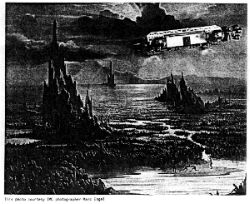
First off, I should point out that when discussing specific episodes that have been shown; these are episodes which have been shown locally and in this order only locally. Other than the first episode being shown first, the local stations don't seem to be showing the episodes in any particular order, which tends to create problems as I'll discuss later.
Space: 1999 has met with its harshest criticism from two fronts: hard core SF fans and Star Trek fans. The hard core SF fans have more than just a passing knowledge of science and physics and thus went into paroxysms of anger over the constant and continuous violation of laws of science and physics which existed just In the first episode. They pointed out, and rightly, that any explosion with the force to hurl the Moon out of orbit would not only have to be of longer duration than the one pictured in the episode, but an explosion of that force would also splinter the moon in to countless fragments. Had Alpha been hurled away on a fragment it would have been more believable. Besides other errors already mentioned earlier in this article, there is also the constant use of having the viewers hear the throbbing of the rocket motors whenever an Eagle passes. Star Trek gave the Enterprise a whooshing noise when it passed during its first season but it didn't keep that very long due to how absurd it was. Effective music used in lieu of the inaccurate noise in a vacuum would be much more pleasing. Just because SILENT RUNNING got away with having explosions heard in a vacuum is no reason to continue an obvious error. Most other episodes of Space: 1999 manage to make at least one major scientific error in each episode, usually a different one each time, so as to maintain variety. Isaac Asimov wrote an article for the NEW YORK TIMES on Space: 1999 and crucified it for this very thing. He maintained that the errors were not made for dramatic effect, which could be forgiven, but out of sheer ignorance.
Star Trek fans have turned away from the show because they had been spoiled by Star Trek. After seeing each episode over and over again, they felt sure that any new SF series with an outer space setting would have to follow some of ST's leads. It didn't. Star Trek's strengths lay in its scripts and in its well defined and explored characters, of which Space: 1999 offered neither. With just flashy special effects to maintain interest, all you have is a light show. They've turned away en masse, although out of the corner of one eye they're still watching to see if it changes any.
Although there have been some truly remarkably bad scripts in some episodes thus far, they have been improving.
The initial episode, Breakaway, was very slow and drawn out, the only point of interest being the few minutes when the explosions occurred.
DEATH'S OTHER DOMAIN ["Death's Other Dominion"] has been the worst so far as it presented a lacklustre script peopled with the most incredibly wooden acting I've ever seen. The only interesting scene in the entire episode was the climax when the man left the planet after 800 years and immediately degenerated into a corpse (pictured on the inside front cover of RBCC 119). The special effects in the episode, as in all the episodes, were marvellous, but the story was so sluggish that halfway through I went out for a hamburger, and when I returned nothing had happened!
The episode FORCE OF LIFE was the first to show that things were looking up as the script was better, the acting and directing had improved, and they even had some different music besides the old "Thunderbirds" music they had been using as up until then the only new score used had been the credits. [It was the first of these episodes to use non-Barry Gray music, but the previous episodes had used original scores by Gray, not Thunderbirds music.] Although this one was good it continued what has become a nagging tradition on the show, that being scripts which are not thought out enough to provide answers to questions which they raise. We never really did find out what the FORCE OF LIFE in the title was or whet it accomplished. When Martin Landau and Barbara Bain appeared on the MIKE DOUGLAS show recently as co-hosts for a week, one of the guests was Buster Crabbe. He chanced to ask them about this particular episode and he asked them what the thing was. They didn't know either.
Although the acting and characterizations in the early episodes was poor, it has begun to improve substantially. I still remember cheering when Martin Landau's character smiled for the first time, and thankfully he's kept it up. Barbara Bain is still rather stilted in her portrayal but even her character is getting better. Even Barry Morse's Prof. Bergman Is getting more interesting, especially with the depth given him in the episode BLACK SUN.
BLACK SUN is the episode that was supposed to be shown third (right after FORCE OF LIFE) as it explains where all these planets have been coming from when they only just left the Earth's orbit (also why they're 800 years in the future as mentioned In DEATHS OTHER DOMAIN). The BLACK SUN is a hole in space which, despite their efforts to avoid it, they enter and pass through without being destroyed. It turns out to be a space/time warp and they come out on the other side of the universe. The trip through ain't 2001 revisited, but it is unique and kinda freaky, especially with the introduction of a cosmic intelligence which speaks to them as they pass through. One could argue about the scientific errors in the show endlessly, but those aside (and some can be explained away) it was damn good! My ambivalence toward the show is fading a bit as I'm beginning to enjoy it.
JAMES VAN HISE